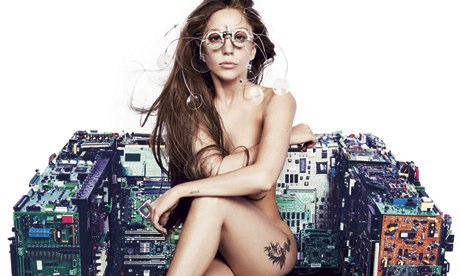
On stage at the Roundhouse in London in September, Lady Gaga outlined the concept behind her third album. As it turned out, said concept had already been outlined in the first single taken from Artpop, Applause: "Pop culture was in art; now art's in pop culture, in me". It was, she said, her "dream" that "art and pop should come together".
Informing the world in 2013 that you've birthed the idea to blend visual art with pop music feels a bit like grandly announcing you've had a brainwave to mix jazz and funk, or thrash and metal. The urge to take Lady Gaga gently by the arm and explain to her that a few people had actually come up with the idea before was hard to suppress.
Still, there was something intriguing about her saying it. The people who'd already done what she seemed to be claiming to do for the first time had allowed visual arts to impact not just on their appearance but their music: the feedback and tumult of the early Who was an attempt to render Gustav Metzger's ideas about auto-destructive art in sound; the Velvet Underground's love of repetition mirrored the multiplication of images in Andy Warhol's silkscreens; the postmodern borrowings of Roxy Music's debut were a sonic equivalent of Richard Hamilton's collages. It's a concept Lady Gaga could make use of. There's a disconnect between the extraordinary way she presents her music and the ordinariness of the music itself: easy to ignore when she comes up with a pop song as irrefutable as Bad Romance or Poker Face, a bit glaring when she doesn't. There's no doubt that Gaga is a force for good in noughties pop music – a woman making an effort in age of will-this-do?, her pitch aimed at weird kids and outsiders in a Simon Cowell world, where oddballs exist only to be scoffed at and sent packing at the audition stage – but if her songs occasionally sounded a fraction as odd as she looked, she might be more convincing.
If the exact impact of visual art on the musical content of Artpop is hard to determine – alas, one suspects, because it hasn't had one – it's certainly at its most interesting when it shifts away from the standard dance-pop blueprint. The music on Sexxx Dreams keeps being drowned out with weird retorts of slap bass, while Do What U Want features Giorgio Moroder synths behind a guest vocal from R Kelly, who doesn't appear to have checked what the rest of the song was about before writing his lyrics: thus an intriguing exploration of the addictive nature of celebrity, which first angrily brushes off Gaga's critics then admits she thinks being attacked is better than being ignored – "if you ever let me go, I would fall apart" – is interrupted by a man singing about his penis. Co-produced, a little improbably, by Israeli psychedelic trance duo Infected Mushroom, Aura opens with distorted vocals and what appears to be an oud, then the bassline sounds like a dubstep drop sped up until it's frantic and churning, and Gaga's voice drawls in a manner that recalls forgotten new-wave starlet Cristina. Dope would just be an example – albeit a superior one – of a pop ballad were it not for the bizarre vocal, which starts out slurred and ends up on the verge of hysteria. Whether you believe it's bravely mapping out a previously uncharted territory between mainstream power ballardry and the dissolute anguish of Neil Young's Tonight's the Night or just sounds like someone auditioning for The X Factor after an afternoon in Wetherspoons, it's not really something you could imagine any of Gaga's peers releasing.
The shame is that Artpop doesn't do that kind of thing more often. There's something exciting about seeing Sun Ra in the songwriting credits of Venus, but, alas, the late Saturnian jazz explorer's influence is hard to detect: it samples a snatch of Zombie Zombie's electropop version of his Rocket Number 9, but the result is standard Daft-Punk-meets-Euro-oompah. And when the music becomes more identikit, it causes your attention to focus on the lyrics, which is something of a mixed blessing. On the one hand, there's an appealing unease about Donatella, which starts out as a gleeful celebration of the fashion world's ephemerality and bitchiness before suddenly raising the topic of eating disorders: "Walk down the runway but don't puke, you just had a salad today." On the other, there are her lyrics about sex, which one starts to rank in a league table of awfulness: Manicure's "put your hands all over my body parts" is just beaten by G.U.Y.'s instruction to "mount your goddess", largely because the latter is delivered in a voice that's presumably supposed to sound quietly forceful, as befits a song about sexual roleplay, but in reality has all the subtle erotic charge of a recorded message informing you that may have been missold PPI.
There are moments on Artpop when Gaga pulls off the Bad Romance trick of writing a pop song so melodically potent that its other shortcomings cease to matter: Fashion's straight-up disco, the five minutes of gleeful marijuana advocacy that is Mary Jane Holland. Gypsy, meanwhile, throws together earnest, piano-backed Springsteenisms – "chase the sunset, bust the rearview … it's you and me, baby, for life" – and pounding, wilfully tacky Europop into something ridiculous and irresistible. As it careers to a luminous climax, you briefly forget that what you're listening to is patently not what Lady Gaga claims it is. That said, nor is Artpop the car crash her detractors are willing it to be. It's a decent, if flawed, pop album, its good bits good enough to keep her filling stadiums as big as the gulf between her ideas and her music.

